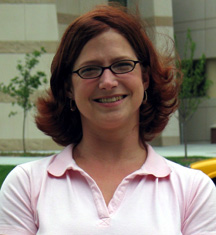 |
Laura Wilwerding, M.D. |
“This program is designed to build community support for breastfeeding, which in turn will encourage women to breastfeed even longer and get the additional benefits that come from breastfeeding,” said Laura Wilwerding, M.D., assistant professor of pediatrics at UNMC, co-chairwoman of the Heartland Alliance for Breastfeeding Advocacy, and chairwoman of the breast-feeding section of the Nebraska Chapter of the American Academy of Pediatrics. “If women are uncomfortable going out and breastfeeding in public, then they’re more likely to quit prematurely.
“The benefits of breastfeeding go far beyond the individual baby. They extend to the community and all of society. Breastfeeding leads to better health and this results in reduced health care costs. Everyone benefits.”
Members of the alliance will be approaching businesses in person, by phone, and via e-mail during August and future months to participate. Businesses also may enroll by going to the alliance’s Web site at www.geocities.com/heartlandalliance/.
At UNMC, the Olson Center for Women’s Health has a mother’s room with a breast pump available. Employees may contact the Olson Center at 559-6345 to arrange times to use the room. Call 552-3487 to learn about other rooms available on campus, or to talk with lactation consultants Tess Parriot and Donna Slovinsky, who also serve on the Heartland Alliance for Breastfeeding Advocacy.
Babies grow and develop best when exclusively breastfed for six months. Continued breastfeeding with complementary feeding after six months also is important to infant and toddler health. The American Academy of Pediatrics encourages breastfeeding until at least a year with complementary foods after six months and thereafter as long as mutually desired. The World Health Organization and UNICEF recommend that breastfeeding should continue after six months with appropriate complementary foods up to two years or beyond.
Artificially fed and mixed-fed infants, i.e., those who are breast and formula fed, are sick more often with diarrhea, pneumonia and other infections. When they are older, artificially fed babies are more likely to be overweight, have more allergies, and lower scores on intelligence tests. In addition, some studies have suggested that formula fed infants are at higher risk for diabetes, leukemia and some other cancers.
According to the alliance, exclusive breastfeeding is rare in many countries. The aim of this year’s theme, Exclusive Breastfeeding: the Gold Standard, is to help everyone to understand about exclusive breastfeeding, to believe in its benefits, and to find ways to support and encourage mothers to do it, Dr. Wilwerding said.
In addition to the alliance Web site, she encourages individuals to visit http://www.mommythink.com/ to learn more on the program.